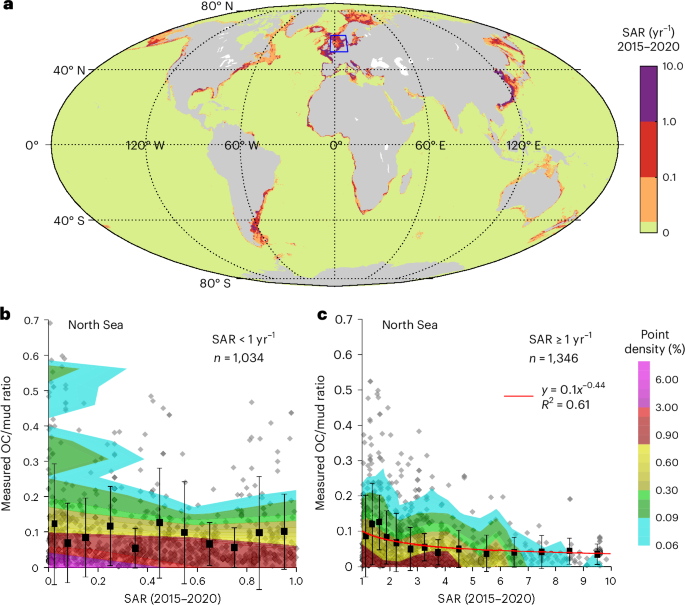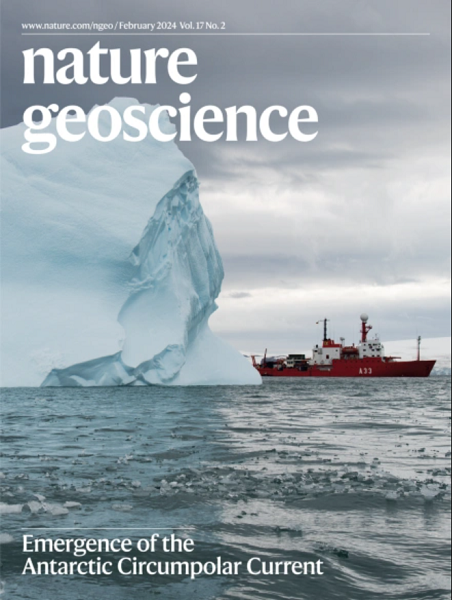Long-term carbon storage in shelf sea sediments reduced by intensive bottom trawling
IF 15.7
1区 地球科学
Q1 GEOSCIENCES, MULTIDISCIPLINARY
引用次数: 0
Abstract
Bottom trawling represents the most widespread anthropogenic physical disturbance to seafloor sediments on continental shelves. While trawling-induced changes to benthic ecology have been widely recognized, the impacts on long-term organic carbon storage in marine sediments remains uncertain. Here we combined datasets of sediment and bottom trawling for a heavily trawled region, the North Sea, to explore their potential mutual dependency. A pattern emerges when comparing the surface sediment organic carbon-to-mud ratio with the trawling intensity represented by the multi-year averaged swept area ratio. The organic carbon-to-mud ratio exhibits a systematic response to trawling where the swept area ratio is larger than 1 yr−1. Three-dimensional physical–biogeochemical simulation results suggest that the observed pattern is attributed to the correlated dynamics of mud and organic carbon during transport and redeposition in response to trawling. Both gain and loss of sedimentary organic carbon may occur in weakly trawled areas, whereas a net reduction of sedimentary organic carbon is found in intensely trawled grounds. Cessation of trawling allows restoration of sedimentary carbon stock and benthic biomass, but their recovery occurs at different timescales. Our results point out a need for management of intensely trawled grounds to enhance the CO2 sequestration capacity in shelf seas. Intensive bottom trawling causes a long-term reduction of organic carbon stored in seafloor sediments, suggesting a need for more effective management, according to observations and biogeochemical modelling.


密集的底拖网捕捞减少了陆架海沉积物中的长期碳储存
底拖网捕捞是对大陆架海底沉积物最广泛的人为物理干扰。虽然拖网引起的海底生态变化已得到广泛认可,但其对海洋沉积物中长期有机碳储存的影响仍不确定。在此,我们将北海这一拖网捕捞严重地区的沉积物和底拖网数据集结合起来,探索它们之间潜在的相互依存关系。将表层沉积物有机碳泥比与多年平均拖网面积比所代表的拖网强度进行比较后,发现了一种模式。当掠地面积比大于 1 yr-1 时,有机碳-泥比率会对拖网捕捞产生系统反应。三维物理-生物地球化学模拟结果表明,所观察到的模式是由于拖网作用下泥浆和有机碳在迁移和再沉积过程中的相关动态变化造成的。在弱拖网区域,沉积有机碳既有增加也有减少,而在强拖网区域,沉积有机碳则出现净减少。停止拖网可恢复沉积碳储量和底栖生物量,但其恢复的时间尺度不同。我们的研究结果表明,有必要对密集拖网捕捞区进行管理,以提高陆架海域的二氧化碳螯合能力。
本文章由计算机程序翻译,如有差异,请以英文原文为准。
求助全文
约1分钟内获得全文
求助全文
来源期刊

Nature Geoscience
地学-地球科学综合
CiteScore
26.70
自引率
1.60%
发文量
187
审稿时长
3.3 months
期刊介绍:
Nature Geoscience is a monthly interdisciplinary journal that gathers top-tier research spanning Earth Sciences and related fields.
The journal covers all geoscience disciplines, including fieldwork, modeling, and theoretical studies.
Topics include atmospheric science, biogeochemistry, climate science, geobiology, geochemistry, geoinformatics, remote sensing, geology, geomagnetism, paleomagnetism, geomorphology, geophysics, glaciology, hydrology, limnology, mineralogy, oceanography, paleontology, paleoclimatology, paleoceanography, petrology, planetary science, seismology, space physics, tectonics, and volcanology.
Nature Geoscience upholds its commitment to publishing significant, high-quality Earth Sciences research through fair, rapid, and rigorous peer review, overseen by a team of full-time professional editors.
 求助内容:
求助内容: 应助结果提醒方式:
应助结果提醒方式:


